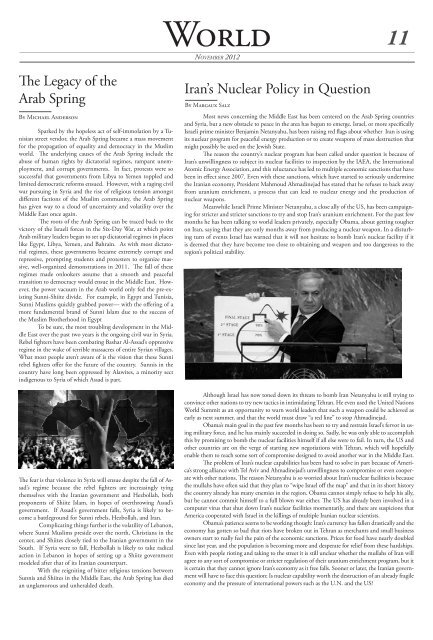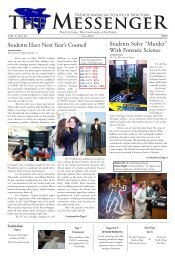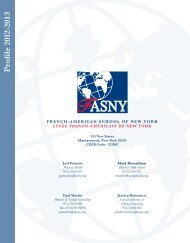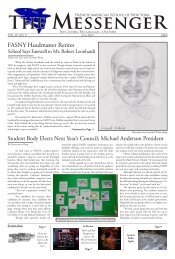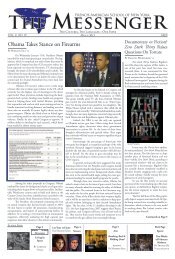ThE MESSENGER - Franco-American School of New York
ThE MESSENGER - Franco-American School of New York
ThE MESSENGER - Franco-American School of New York
- No tags were found...
Create successful ePaper yourself
Turn your PDF publications into a flip-book with our unique Google optimized e-Paper software.
World 11November 2012The Legacy <strong>of</strong> theArab SpringBy Michael AndersonSparked by the hopeless act <strong>of</strong> self-immolation by a Tunisianstreet vendor, the Arab Spring became a mass movementfor the propagation <strong>of</strong> equality and democracy in the Muslimworld. The underlying causes <strong>of</strong> the Arab Spring include theabuse <strong>of</strong> human rights by dictatorial regimes, rampant unemployment,and corrupt governments. In fact, protests were sosuccessful that governments from Libya to Yemen toppled andlimited democratic reforms ensued. However, with a raging civilwar pursuing in Syria and the rise <strong>of</strong> religious tension amongstdifferent factions <strong>of</strong> the Muslim community, the Arab Springhas given way to a cloud <strong>of</strong> uncertainty and volatility over theMiddle East once again.The roots <strong>of</strong> the Arab Spring can be traced back to thevictory <strong>of</strong> the Israeli forces in the Six-Day War, at which pointArab military leaders began to set up dictatorial regimes in placeslike Egypt, Libya, Yemen, and Bahrain. As with most dictatorialregimes, these governments became extremely corrupt andrepressive, prompting students and protesters to organize massive,well-organized demonstrations in 2011. The fall <strong>of</strong> theseregimes made onlookers assume that a smooth and peacefultransition to democracy would ensue in the Middle East. However,the power vacuum in the Arab world only fed the pre-existingSunni-Shiite divide. For example, in Egypt and Tunisia,Sunni Muslims quickly grabbed power— with the <strong>of</strong>fering <strong>of</strong> amore fundamental brand <strong>of</strong> Sunni Islam due to the success <strong>of</strong>the Muslim Brotherhood in EgyptTo be sure, the most troubling development in the MiddleEast over the past two years is the ongoing civil war in Syria.Rebel fighters have been combating Bashar Al-Assad’s oppressiveregime in the wake <strong>of</strong> terrible massacres <strong>of</strong> entire Syrian villages.What most people aren’t aware <strong>of</strong> is the vision that these Sunnirebel fighters <strong>of</strong>fer for the future <strong>of</strong> the country. Sunnis in thecountry have long been oppressed by Alawites, a minority sectindigenous to Syria <strong>of</strong> which Assad is part.The fear is that violence in Syria will ensue despite the fall <strong>of</strong> Assad’sregime because the rebel fighters are increasingly tyingthemselves with the Iranian government and Hezbollah, bothproponents <strong>of</strong> Shiite Islam, in hopes <strong>of</strong> overthrowing Assad’sgovernment. If Assad’s government falls, Syria is likely to becomea battleground for Sunni rebels, Hezbollah, and Iran.Complicating things further is the volatility <strong>of</strong> Lebanon,where Sunni Muslims preside over the north, Christians in thecenter, and Shiites closely tied to the Iranian government in theSouth. If Syria were to fall, Hezbollah is likely to take radicalaction in Lebanon in hopes <strong>of</strong> setting up a Shiite governmentmodeled after that <strong>of</strong> its Iranian counterpart.With the reigniting <strong>of</strong> bitter religious tensions betweenSunnis and Shiites in the Middle East, the Arab Spring has diedan unglamorous and unheralded death.Iran’s Nuclear Policy in QuestionBy Margaux SalzMost news concerning the Middle East has been centered on the Arab Spring countriesand Syria, but a new obstacle to peace in the area has begun to emerge. Israel, or more specificallyIsraeli prime minister Benjamin Netanyahu, has been raising red flags about whether Iran is usingits nuclear program for peaceful energy production or to create weapons <strong>of</strong> mass destruction thatmight possibly be used on the Jewish State.The reason the country’s nuclear program has been called under question is because <strong>of</strong>Iran’s unwillingness to subject its nuclear facilities to inspection by the IAEA, the InternationalAtomic Energy Association, and this reluctance has led to multiple economic sanctions that havebeen in effect since 2007. Even with these sanctions, which have started to seriously underminethe Iranian economy, President Mahmoud Ahmadinejad has stated that he refuses to back awayfrom uranium enrichment, a process that can lead to nuclear energy and the production <strong>of</strong>nuclear weapons.Meanwhile Israeli Prime Minister Netanyahu, a close ally <strong>of</strong> the US, has been campaigningfor stricter and stricter sanctions to try and stop Iran’s uranium enrichment. For the past fewmonths he has been talking to world leaders privately, especially Obama, about getting tougheron Iran, saying that they are only months away from producing a nuclear weapon. In a disturbingturn <strong>of</strong> events Israel has warned that it will not hesitate to bomb Iran’s nuclear facility if itis deemed that they have become too close to obtaining and weapon and too dangerous to theregion’s political stability.Although Israel has now toned down its threats to bomb Iran Netanyahu is still trying toconvince other nations to try new tactics in intimidating Tehran. He even used the United NationsWorld Summit as an opportunity to warn world leaders that such a weapon could be achieved asearly as next summer, and that the world must draw “a red line” to stop Ahmadinejad.Obama’s main goal in the past few months has been to try and restrain Israel’s fervor in usingmilitary force, and he has mainly succeeded in doing so. Sadly, he was only able to accomplishthis by promising to bomb the nuclear facilities himself if all else were to fail. In turn, the US andother countries are on the verge <strong>of</strong> starting new negotiations with Tehran, which will hopefullyenable them to reach some sort <strong>of</strong> compromise designed to avoid another war in the Middle East.The problem <strong>of</strong> Iran’s nuclear capabilities has been hard to solve in part because <strong>of</strong> America’sstrong alliance with Tel Aviv and Ahmadinejad’s unwillingness to compromise or even cooperatewith other nations. The reason Netanyahu is so worried about Iran’s nuclear facilities is becausethe mullahs have <strong>of</strong>ten said that they plan to “wipe Israel <strong>of</strong>f the map” and that in its short historythe country already has many enemies in the region. Obama cannot simply refuse to help his ally,but he cannot commit himself to a full blown war either. The US has already been involved in acomputer virus that shut down Iran’s nuclear facilities momentarily, and there are suspicions thatAmerica cooperated with Israel in the killings <strong>of</strong> multiple Iranian nuclear scientists.Obama’s patience seems to be working though: Iran’s currency has fallen drastically and theeconomy has gotten so bad that riots have broken out in Tehran as merchants and small businessowners start to really feel the pain <strong>of</strong> the economic sanctions. Prices for food have nearly doubledsince last year, and the population is becoming more and desperate for relief from these hardships.Even with people rioting and taking to the street it is still unclear whether the mullahs <strong>of</strong> Iran willagree to any sort <strong>of</strong> compromise or stricter regulation <strong>of</strong> their uranium enrichment program, but itis certain that they cannot ignore Iran’s economy as it free falls. Sooner or later, the Iranian governmentwill have to face this question: Is nuclear capability worth the destruction <strong>of</strong> an already fragileeconomy and the pressure <strong>of</strong> international powers such as the U.N. and the US?


